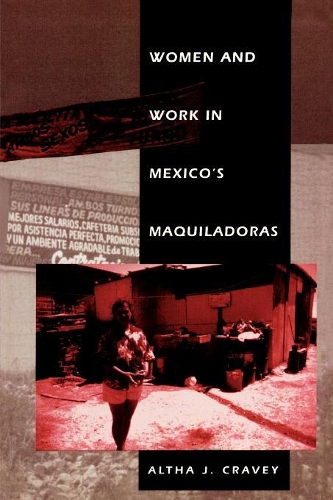
Women and Work in Mexico's Maquiladoras
(Paperback)
Publishing Details
Women and Work in Mexico's Maquiladoras
By (Author) Altha J. Cravey
Bloomsbury Publishing PLC
Rowman & Littlefield Publishers
5th November 1998
United States
Classifications
General
Non Fiction
Sociology: work and labour
331.4870972
Physical Properties
Paperback
192
Width 147mm, Height 229mm, Spine 11mm
254g
Description
The emergence of global assembly plants is closely linked to the creation of a global female industrial labor force. Women and Work in Mexico's Maquiladoras examines this larger process in Mexico, wheredespite a century of industrialization and a tradition of well-paid, highly organized, male workersthe maquiladora factories have turned to predominantly female labor.
Exploring this dramatic shift, this book convincingly demonstrates how gender restructuring in workplaces and households has become a crucial element in the reorientation of Mexican development. The author compares Mexico's new industrial system with its historical antecedent and documents federal policy changes that have resulted in distinct patterns of gender, unionization, household form, and social welfare.
Rich in ethnographic detail, the book uses the voices of workers themselves to provide an intimate look at how daily lives have been transformedin ways that could not have been foreseenby the national and international processes shaping the country's industrial transition.
Reviews
This is a great book. Easy to read, it provides a fascinating account of how changes in industrial structure brought about by Mexico's shift from a state-led industrialization to one led by market forces and guided by neo-liberal principles are bringing with them changes in family structure, living arrangements, and processes of social reproduction as the old 'male-wage-earning-nuclear-family' as ideal is gradually being replaced by new patterns of household formation. As an intellectual contribution to the literature on gender, development, and labor, Altha Cravey's Women and Work in Mexico's Maquiladoras is a first-rate book that deserves to be read widely. * Annals of the Association of American Geographers *
Accessible to upper-division undergraduates and up. -- A. Bunton * Choice Reviews *
Altha Cravey broadens the scope of analysis concerning gender and industrial transformations. Cravey's analysis moves beyond the shop floor to include the organization of production and, especially, social reproduction in different industrial regions. Thus this book incorporates far more than the title suggests. * Economic Geography *
Altha Cravey's book manages to provide some new insights into the relationships between different industrial production regimes, the state, and changes in social relations and reproduction. * Progress In Human Geography *
The book is useful in showing that Mexico had a fully constituted industrial system before maquiladoras developed and that workers in the new system have lost a great deal in the transition. * New Mexico Historical Review *
A significant contribution to the literature on industrialization, social reproduction, and households. Altha Cravey rightly places gender in strategic considerations of these areas. With its rich field research and creative, spatially developed research design, this book is highly recommended for courses on the sociology of development, of gender, and of international studies. -- Kathleen Staudt, University of Texas at El Paso
Author Bio
Altha J. Cravey is assistant professor of geography at the University of North Carolina, Chapel Hill.
